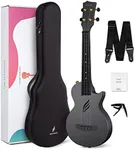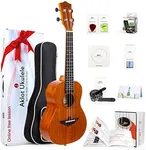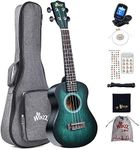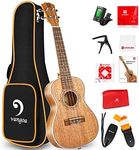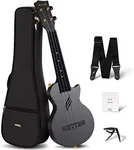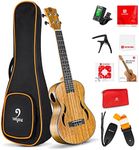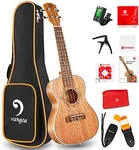Buying Guide for the Best Ukuleles
Choosing the right ukulele can be a delightful experience if you know what to look for. The ukulele is a versatile and fun instrument that comes in various sizes, materials, and designs. Understanding the key specifications will help you find the best fit for your musical needs and preferences. Here are the main aspects to consider when selecting a ukulele.SizeUkuleles come in four main sizes: soprano, concert, tenor, and baritone. The size affects the instrument's sound, playability, and portability. Soprano ukuleles are the smallest and produce a bright, traditional ukulele sound, making them great for beginners and children. Concert ukuleles are slightly larger, offering a fuller sound and more finger space, suitable for those who find soprano too small. Tenor ukuleles provide an even deeper sound and more room on the fretboard, ideal for performers and those with larger hands. Baritone ukuleles are the largest, with a sound closer to a classical guitar, perfect for those looking for a richer, deeper tone. Choose the size based on your comfort, the sound you prefer, and how you plan to use the ukulele.
MaterialThe material of a ukulele significantly influences its sound and durability. Common materials include laminate wood, solid wood, and plastic. Laminate wood ukuleles are more affordable and resistant to changes in humidity, making them a good choice for beginners and casual players. Solid wood ukuleles, often made from mahogany, koa, or spruce, offer superior sound quality and resonance but require more care and are typically more expensive. Plastic ukuleles are durable and great for travel or outdoor use, though they may not provide the same sound quality as wood. Consider where and how often you will play your ukulele to determine the best material for your needs.
StringsUkulele strings can be made from various materials, including nylon, fluorocarbon, and gut. Nylon strings are the most common, offering a warm sound and comfortable playability, suitable for most players. Fluorocarbon strings provide a brighter tone and greater durability, making them a good choice for advanced players seeking a more defined sound. Gut strings, though less common, offer a traditional feel and sound but require more maintenance and are sensitive to humidity. Your playing style and the sound you desire should guide your choice of strings.
TuningUkuleles are typically tuned to G-C-E-A, but baritone ukuleles are tuned to D-G-B-E, similar to the highest four strings of a guitar. The tuning affects the instrument's sound and how you play it. Standard G-C-E-A tuning is great for beginners and those who want the classic ukulele sound. If you are a guitarist or prefer a deeper tone, a baritone ukulele with D-G-B-E tuning might be more suitable. Consider your musical background and the type of music you want to play when choosing the tuning.
Brand and Build QualityThe brand and build quality of a ukulele can impact its sound, playability, and longevity. Reputable brands are known for their craftsmanship and consistent quality, ensuring a better playing experience. Look for ukuleles with good reviews and recommendations from other players. Pay attention to details like the finish, fretwork, and overall construction. A well-built ukulele will not only sound better but also last longer, providing more value over time. Choose a brand and build quality that fits your expectations and playing level.
